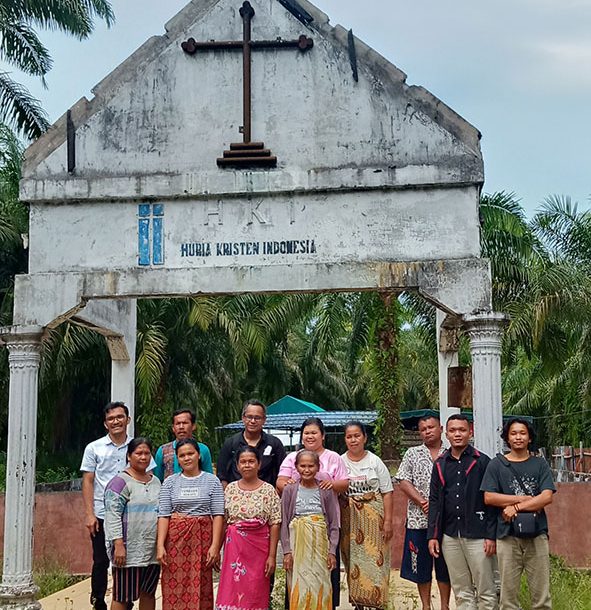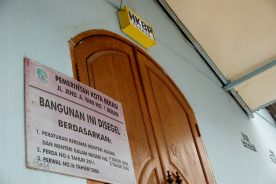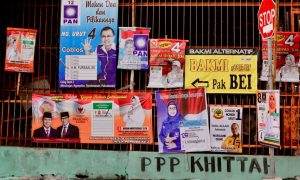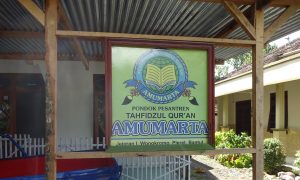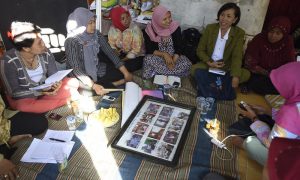Since the attacks, arson, and demolition of several churches in Aceh Singkil Regency, Aceh Province, Indonesia (2015), religious freedoms in churches in Aceh Singkil Regency has been disrupted. The settlement’s direction has remained unclear for the past six years, as evidenced by the ambiguous responses of central and regional governments to reconciliation and religious freedom. According to information from field interviews, this problem is further complicated as the role of civil society and ecumenical institutions in advocacy in Aceh Singkil Regency has weakened, including the growing cracks and suspicions among struggling churches at local level. The local government has exploited these problems to weaken the struggle for the right to worship in Aceh Singkil Regency.
According to the records of the Aceh Singkil Peace Forum (Forcidas), there are currently 20 churches whose permits have been denied by the local government, with no resolution in sight. Furthermore, 7 churches continue to worship under tents in unsuitable conditions, particularly for coaching activities for children, who are exposed to hot weather, mosquitoes, and a lack of supporting facilities. This is evident in the field data related to the struggles of churches in Aceh Singkil in advocating for freedom of religion or belief (FORB) in the public sphere. Data is gathered through in-depth interviews with several churches in Aceh Singkil that have been affected by disturbances such as fire-raising, demolition, and obstruction of church buildings, and includes information from the Forcidas and some officials from synods whose congregations are disrupted.
Issues arose after 13 October 2015, when an intolerant crowd set fire to the Church of Huria Kristen Indonesia (HKI) in Gunung Meriah District and attacked the Church of Pak-Pak Dairi (GKPPD) in Simpang Kanan District. This was followed by the demolition of 9 churches by the local government, through the Civil Service Police Unit (Satpol PP), from 19-24 October 2024. Police also supervised the demolition process. The approval for the demolition of the 9 churches was given under pressure, as happened at the Church of GKPPD Sanggaberu (located in the Gunung Meriah sub-district) where the Satpol PP and security forces sought out church administrators to compel them to sign a demolishment agreement. As a result, according to in-depth interview in GKPPD Sanggaberu, some church officials were forced to seek refuge in the forest to escape the pressure.
Looking further back, the events of 13 October 2015 were preceded by the Aceh Singkil Regional Government’s sealing of 20 churches in 2012. Unfortunately, the central and local governments lack the political will to address the various socio-political, cultural, and legal issues surrounding the sealing.
This issue is further complicated by the Aceh Regional Government’s step to issue local regulations (Aceh Qanun No. 4/2016) concerning Guidelines for Maintaining Religious Harmony and Establishment of Places of Worship. This regulation further narrows the space for reconciliation and human rights-based pluralism in Aceh Province, particularly in Aceh Singkil. This is because the Aceh Qanun No. 4/2016 is, according to the 2020 position paper made by joint working team of 3 human right-related organizations (Kontras Aceh, Philosufi institute and LBH Aceh), in violation of the Indonesian government’s ratification of human rights principles, namely the Universal Declaration of Human Rights document, which has been ratified in Law no. 39 of 1999 on Human Rights, International Covenant on Civil and Political Rights (ICCPR), ratified in Law no. 12 of 2005, and the International Covenant on Economic, Social and Cultural Rights (ICESCR) which was ratified in Law Number 11 of 2005.
Aceh Qanun No. 4/2016 also violates the Helsinki agreement (2005) which emphasises that human rights principles must be the basis for the formulation of the written law (legal code) in Aceh. In addition, the Helsinki agreement also places matters of freedom of religion (justice and freedom of religion) within the authority of the central government, not local governments. These two points are also reflected in Law No. 11 of 2006 concerning the Government of Aceh (Law No. 11/2006).
Furthermore, Aceh Qanun No. 4/2016 includes inseparable link between territorial claims and political system in Aceh. This is then followed by a process of exclusion of those categorised as outsiders, carried out by both state actors (local governments) and non-state actors (Islamic organizations). This direction can be seen from the pressure applied through Aceh Qanun No. 4/2016 which places the management of religious life within the framework of Islamic law (aqidah or religious creed), stressing ethnic identity and Aceh region as an area claimed exclusively by Acehnese Muslims. Consequently, in practice Aceh Qanun No. 4/2016 does not allow space for the establishment of non-Islamic houses of worship.
Trying out a more sophisticated measure of how religious intolerance varies across Indonesia's provinces.
Measuring religious intolerance across Indonesian provinces
Complicating matters further, this implicit prohibition is framed by Islamic law. As a result, questioning the regulation may be interpreted as a violation of Islamic doctrine. In some cases, according to in-depth interview with the Forcidas and officials from the Church of HKI in Gunung Meriah District and the Church of GKPPD Sanggaberu, local community support for church construction was eventually withdrawn due to doctrinal pressure from local Islamic elites, who deemed such support contrary to Islamic law.
Aceh Qanun No. 4/2016 raises the requirement for the number worshippers from 90 people (according to PBM 2006) to 140 people, and as the number of community supporters from 60 people (according to PBM 2006) to 110 people.
The term “house of worship” was replaced with “places of worship”. This is consistent with the argument used by the Aceh Singkil local government and intolerant groups to obstruct church construction, particularly by referring to the 2001 agreement that only permitted one church building (house of worship) and four undung-undung (small place of worship) in Aceh Singkil. In other words, churches do not have permission at all to construct new church buildings to accommodate the growing number of Christians in Aceh Singkil. The agreement, according to in-depth interviews with the Forcidas and the 2016 legal opinion document on Aceh Singkil, is problematic because it was carried out in an opaque and coercive manner for Christian groups.
Aceh Qanun No. 4/2016 also specifies five recommendations that must be met to construct a house of worship, three more than the earlier PBM 2006. One complication in this regard is the requirement to obtain a recommendation from the Imeum Mukim, a traditional and religious leader (imeum) who leads a mukim (residential area). An imeum is in charge of ensuring the implementation of Islamic law and traditional life in the area and may use their social and religious power to complicate, if not obstruct, the legally enshrined right of other religions to worship, particularly the right to own a house of worship.
The actions of local community members who support the establishment of houses of worship for other religions are read by local elites as contrary to Islamic law. Strong social regulation resulting from the overlapping of territorial claims (the entire Aceh region) with ethnoreligious identities in Aceh further disincentives supporters.
Aceh Qanun No. 4/2016 also substitutes the term “local community support” in the PBM 2006 with the term “non-users of places of worship support”, implicitly specifying Muslim support. As a result, even in villages where the majority, or the entire, population is Christian, the construction of churches continues to be difficult, considering support for church construction is considered contrary to Islamic Shari’a (aqidah). Thus, exclusion of church construction also gains doctrinal justification.
Finally, Aceh Qanun No. 4/2016 alters the conditions that require local governments to provide places of worship. In PBM 2006, if 90 people or more require a place of worship, the local government must provide places of worship even without sufficient local community support. Aceh Qanun No. 4/2016 eliminates local governments’ responsibility to provide houses of worship for Christians, raising the level and specificity of support required and exploiting doctrinal justifications which discourage non-user support. Aside from all these issues, the local political landscape in Aceh has harmed Christians’ right to worship. According to the Forcidas, as regional and national elections take place, pressure on Christians in Aceh will increase as local political contestants exploit ethnoreligious sentiments that align with territorial claims. This is one of the concerns of Christians in Aceh as they prepare for the 2024 national election, where the “warming up” has begun.
Another barrier to worship in Aceh Singkil is the poor performance of civil society and the ecumenical network in freedom of religion advocacy at the local level. Forcidas has coordinated various civil society groups to bring the Aceh Singkil issue to the national level, including hearings with representatives from several European countries. Various advocacy documents have also been submitted by the Forcidas to churches via the Indonesian Communion of Churches (CCI/PGI). However, advocacy remains poor and has no clear direction at the local and national levels.
The CCI/PGI has asked the government of Indonesia to carry out its responsibility to protect the community and guarantee religious freedom in Aceh Singkil, including publishing a legal opinion regarding the sealing of houses of worship in Aceh Singkil. Meetings have been held, between the leaders of GKPPD Church with the government and Islamic religious leaders in Aceh Singkil, with the Coordinating Minister for Political, Legal, and Security Affairs of the Republic of Indonesia (Kemenko Polhukam RI), and in December 2020, the National Human Rights Commission facilitated a meeting between church representatives and local government officials in Aceh.
Unfortunately, the fate of churches in Aceh Singkil is still uncertain, and local government and religious elites continue to exert pressure. Central and local governments are unwilling to build reconciliation and ensure religious freedom in Aceh. Civil society organizations and the CCI/PGI-related ecumenical networks have failed to effectively advocate on behalf of churches. Consequently, there is no mitigation of regulatory, social, cultural, and economic barriers to religious freedom, and the pillars necessary to support pluralism and reduce bottlenecks at the local level are almost non-existent. In conflict areas like Aceh Singkil, we can see how interfaith and the CCI/PGI-related ecumenical networks fail to generate effective ongoing interfaith action or discussion at the grassroots level.
When we examine the CCI/PGI advocacy work over the last five years as detailed in the 2014-2019 PGI report, it appears that there has been no effective advocacy. CCI/PGI advocacy activities only included a PGI letter protesting the caning of non-Muslims and a request to review related regulations that infringe on religious freedom, media training conducted by The Yakoma-PGI and the Union of Journalists for Diversity in Indonesia. What emerges is the PGI perspective that challenges to religious freedom in Aceh Singkil are solely the government’s responsibility, because the CCI/PGI sees itself as an institution without power. This perspective is fallacious because advocacy work is by definition not an exercise of government power. Moreover, even though the Aceh Singkil problem has numerous variables the CCI/PGI does not take a dynamical view and thus fails to empower itself to act, particularly at local level.
As a result, the people of Aceh Singkil appear fragmented and suspicious, and thus become embers with the potential to explode.
 Facebook
Facebook  Twitter
Twitter  Soundcloud
Soundcloud  Youtube
Youtube  Rss
Rss 